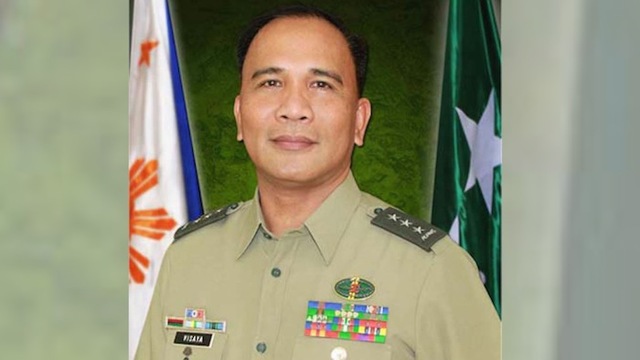The dark horse in the race, Ricardo Visaya is controversial among human rights groups. But to his fellow soldiers, he is a a bemedalled officer worthy of respect.

The Army
battalion commander during the 2004 bloody clashes with Hacienda Luisita
workers is now a 3-star general and among the contenders to become the next
chief of the Armed Forces of the Philippines (AFP).
As he joins the
race for the coveted post, Lieutenant General Ricardo Visaya, a bemedalled
officer and combatant, is haunted by the operation that had gone wrong. (READ: New
AFP chief on Friday: Aquino, Gazmin ex-aides contenders)
But it's the same
operation that could be his ticket to the top post in the military.
It was in 2004
when he got to know his current commander-in-chief, President Benigno Aquino
III. At the time of the strike, Aquino, then Tarlac representative, was said to
have also acted as the manager of the family estate.
Visaya was then
commander of the 69th Infantry Battalion based in Central
Luzon . He was on the ground with his men, according to Cristina
Palabay of Karapatan, the rights group that has blamed Aquino and
Visaya for the death
of 7 workers.
It was there that
Aquino got to know the general.
Aquino and Visaya
eventually faced murder charges before the Office of the Ombudsman, although
the cases have since been dismissed.
Beyond Hacienda
Luisita, Visaya also proved to be an effective counter-insurgency commander. He
was closely associated with his superior at the time, the now detained
Major General Jovito Palparan, who was 7th Infantry Division chief
in charge of Army units in Central Luzon .
Palparan faces various charges of human rights violations allegedly committed
under the Arroyo government.
Respected
in the military
While Visaya is
controversial among leftists and human rights groups, the general is widely
respected in the military.
The Scout Ranger
is now the chief of the Southern Luzon Command (Solcom).
His recent
promotion to the 3-star position encouraged his supporters to lobby for his
appointment as chief of staff.
His two closest
rivals in the race, Army chief Lieutenant General Hernando Iriberri and Air
Force chief Lieutenant General Jeffrey Delgado, are both reaching the mandatory
retirement age of 56 at the height of the campaign period for the May 2016
elections.
Delgado will turn
56 in March 2016; Iriberri, in April 2016.
A 1983 graduate
of the Philippine Military Academy, Visaya is retiring in December 2016 yet –
way past the inaguration of a new president. This is one reason young officers
are pushing for him.
Iriberri's
strongest backer, however, is Defense Secretary Voltaire Gazmin, who has vetted
all chiefs of staff named by Aquino since he became president and is Aquino's
most influential adviser on military affairs.
Delgado is a
former aide of Aquino's mother, the late President Corazon Aquino.
Aquino can choose
to extend the term of the chief of staff up to when he steps down in June 2016.
Should he name
Irriberi as AFP boss, this would make Visaya the strongest contender to replace
Iriberri as Army commanding general.
The President is
expected to make his choice on Thursday, July 9.
The turnover
ceremony will be on Friday, July 10, at Camp Aguinaldo
http://www.rappler.com/nation/98803-ricardo-visaya-hacienda-luisita-military